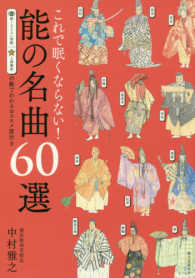- ホーム
- > 洋書
- > 英文書
- > Business / Economics
Full Description
Industry 4.0 Transformation Towards Industry 5.0 Paradigm - Challenges, Opportunities and Practices critically explores the paradigm change from Industry 4.0's integration of digital technology to Industry 5.0's focus on human-robot collaboration. This book highlights Industry 5.0, the aim of which is to merge human intelligence with robotic capabilities to enhance efficiency and sustainability. This shift entails integrating Industry 5.0 technologies like collaborative robots and Human Digital Twins into production processes for safer and more efficient collaboration. Industry 4.0's influence on the tourism sector highlights the need for human-centric approaches and updated education to transition to the digital tourism era. Similarly, the construction sector, under Construction 4.0, faces organizational challenges in adopting technology. The Technology-Organization-Environment (TOE) framework identifies decision-making factors to facilitate this transition. Transportation 5.0 represents a transformative shift towards Cyber-Physical-Social Transportation Systems, prioritizing ethical and sustainable solutions. It harnesses advanced technologies to improve transportation efficiency while considering social impacts. Nano and Society 5.0 explore nanotechnology's role in advancing societal goals, from personalized health care to sustainable energy. Digital entrepreneurship, propelled by Industry 4.0, faces challenges and opportunities amidst technological evolution and the pandemic's effects. In education, Online Distance e-Learning (OdeL) practices leverage digitalization for interactive learning, emphasizing critical thinking and industry-relevant skills. Overall, Industry 5.0 represents a holistic transformation driven by human intelligence, technology, and sustainability. This book serves as a guide for navigating this transition, providing insights for industry professionals, policymakers, and researchers. It explores the integration of automation with human-centric methods, fostering efficiency, creativity, and sustainability.








